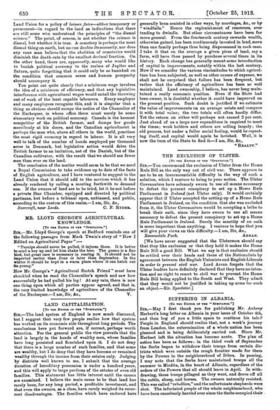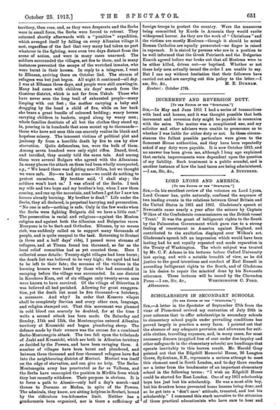SUFFERING IN ALBANIA.
[To THE EDITOR OP THE " SPECTATOR."] Sin,—May I first thank you for publishing Mr. Aubrey Herbert's long letter on Albania in your issue of October 4th, and then beg of you a little apace to continue his tale ? People in England should realize that, not a week's journey from London, the extermination of a whole nation has been planned and is being deliberately carried out. Since Mr. Herbert left the situation has become acute. The plan of action has been as follows : in the third week of September the Serbs began to withdraw their troops from certain dis- tricts which were outside the rough frontier made for them by the Powers in the neighbourhood of Dibra. In passing, I may note that the Serbs have maintained troops all the summer in Mirdita, in the heart of Albania, regardless of the orders of the Powers that all should leave in April. In with- drawing, these troops pillaged as they went, and drove off all the cattle, sheep, and horses. The owners naturally resisted. This was called "rebellion," and the unfortunate shepherds were shot. The infuriated people of the whole neighbourhood, who have been ceaselessly harried ever since the Serbs occupied their
territory, then rose, and, as they were desperate and the Serbs were in small force, the Serbs were forced to retreat. They returned shortly afterwards with a "punitive" expedition, which avenged itself by falling on every Albanian village it met, regardless of the fact that very many had taken no part whatever in the fighting, were even two days distant from the scene of action, and were in many cases unarmed. The soldiers surrounded the villages, set fire to them, and in many instances prevented the escape of the wretched inmates, who were burnt in their houses. In reply to a telegram, I went to Elbasan, arriving there on October 2nd. The stream of refugees was but just begun. All night it continued—all day. I was at Elbasan three days, and people were still crawling in. Many had come with children six days' march from the Gostivar district, which is not far from Uskub. Those who have never seen the long trail of exhausted people—many limping with cut feet ; the mother carrying a baby and dragging by the hand a child of five, while on her back she bears a great bundle of coloured bedding; weary horses carrying children in baskets, urged along by weary men ; whole families destitute of all but the clothes they stand up, in, pouring in in hundreds that soon mount up to thousands— those who have not seen this can scarcely realize its blank and hopeless misery. The innocent victims of political plot and jealousy fly from a horrible death by fire to one by slow starvation. Quite defenceless, too, were the bulk of them. Among seven hundred were only eight rifles. Dazed, tired, and terrified, they mostly told the same tale. And among them were several Bulgars who agreed with the Albanians. In many places the attack on them bad been wholly unexpected, e.g., " We heard there was fighting near Dibra, but we thought we were safe. No—we had no arms—we could do nothing to protect ourselves. My brother said, ' I shall stay ; the soldiers won't hurt us.' I was afraid of the Serbs. I took my wife and two boys and my brother's boy, when I saw them coming, and ran up the mountain, and before I got far I saw ten houses already burning. My brother is dead." Life under the Serbs, they all declared, is perpetual harrying and persecution. " No one is safe—nothing is safe. Only in the few weeks when the Serbs were fighting Bulgaria did we have a little rest." The persecution is racial and religious—against the Moslem religion and against both the Albanian and Bulgarian races. Everyone is to be Serb and Orthodox. Elbasan, by no means rich, was suddenly called on to support many thousands of people, and is quite unequal to the task. Returning to Scutari (a three and a half days' ride), I passed more streams of refugees, and at Tirana found ten thousand, so far as the local relief committee had as yet counted them. Here I collected some details : Twenty-eight villages had been burnt ; the death list was believed to be very high ; the aged had had to be left to their fate ; the screams of the victims in the burning houses were heard by those who had succeeded in escaping before the village was surrounded. In one district in Kerchovo Kaza, out of six villages only twenty-seven men were known to have survived. Of the village of Stirovitza it was believed all had perished. Allowing for great exaggera- tion, yet the death list must be five thousand—a butchery, a massacre. And why? In order that Kossovo vilayet shall be completely Servian and every other race, language, and religion stamped out. That this movement was planned in cold blood can scarcely be doubted, for at the time I write a second attack has been made. On Saturday and Sunday, 11th and 12th, the Montenegrins entered Albanian territory at Krasnichi and began plundering sheep. The defence made by their owners was the excuse for a combined Serbo-Montenegrin attack. The two fell upon the tribelands of Jashi and Krasnichi, which are both in Albanian territory as decided by the Powers, and have been ravaging them. A number of villages have been burnt and plundered, and between three thousand and four thousand refugees have fled into the neighbouring district of Merturi. Merturi was itself on the edge of starvation, and can give no help. The Serbo- Montenegrin army has penetrated as far as Valbona, and the Serbs have reoccupied the position in Mirdita from which they but recently withdrew. Their purpose is obvious. It is to force a path to Alessio—only half a day's march—and thence to Durazzo or Medua, in spite of the Powers. The admirals, they know, are sitting helpless in Scutari, bound by the ridiculous ten-kilometre limit. Neither has a gendarmerie been organized, nor is there a sufficiency of foreign troops to protect the country. Were the massacres being committed by Kurds in Armenia they would excite widespread horror. As they are the work of " Christians "and the victims are mostly Moslems—though it should be noted Roman Catholics are equally persecuted—no finger is raised in reproach. It is stated by persons who are in a position to be well informed that the Greek Patriarch and the Bulgarian Exarch agreed before war broke out that all Moslems were to be either killed, driven out—or baptised. Whether or not these holy men actually issued the order I am unable to say. But I can say without hesitation that their followers have carried out and are carrying out this policy to the letter.—I















































 Previous page
Previous page